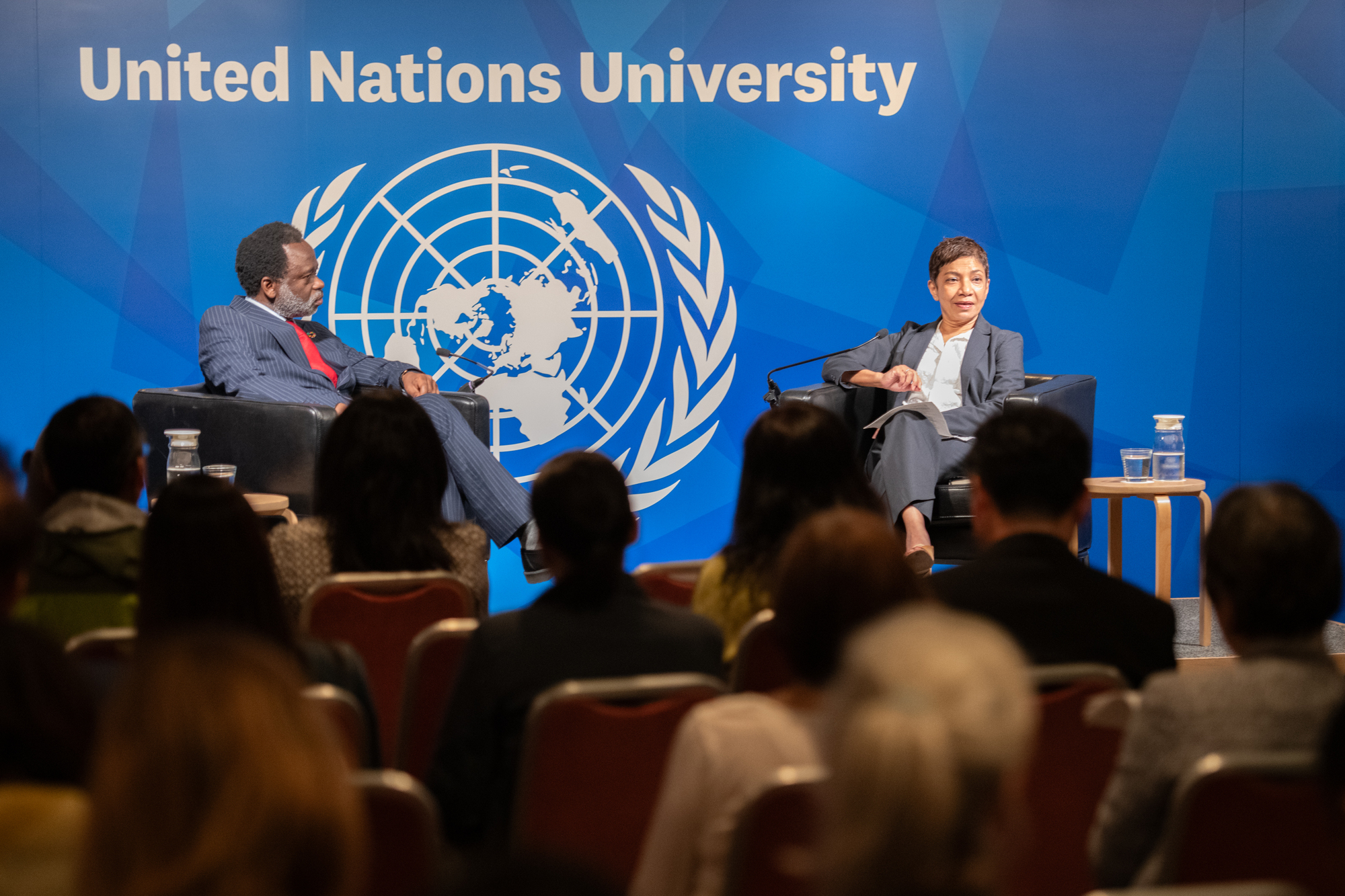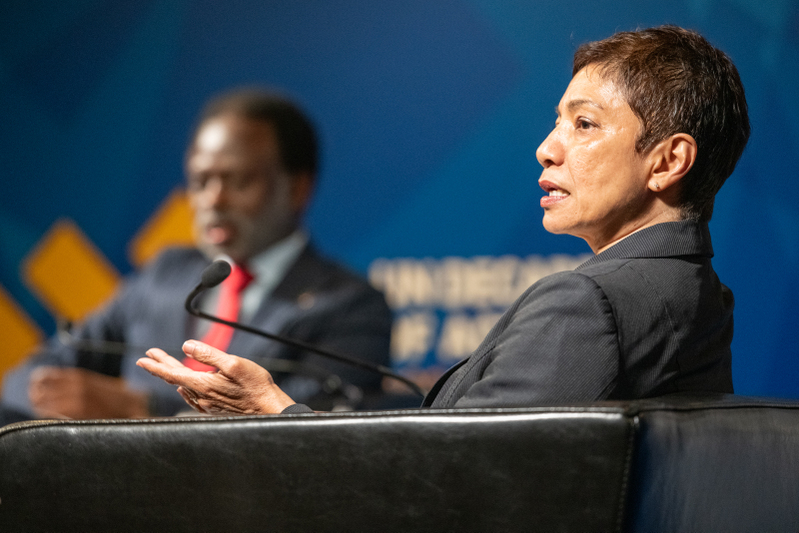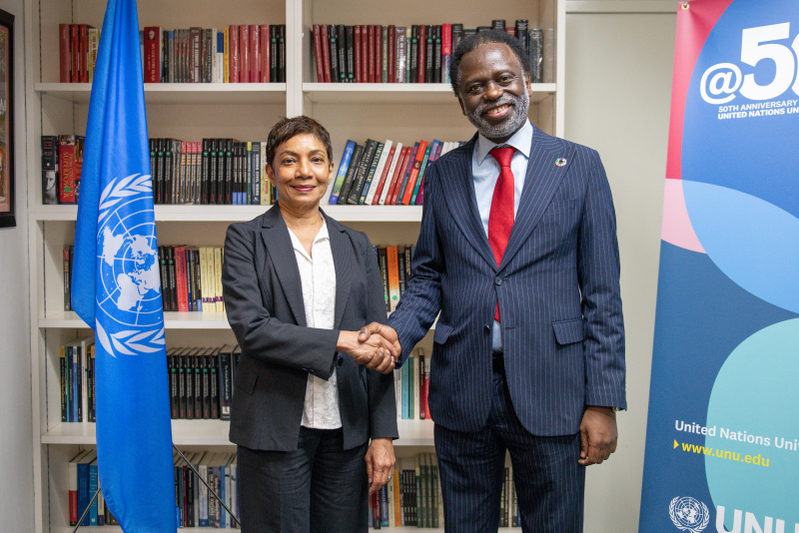UNU hosted a conversation with the ITTO Executive Director on tropical forestry as a nature-based solution
17 April 2025, Tokyo

UNU's Rector Tshilidzi Marwala and ITTO Executive Director Sheam Satkuru at the UNU Conversation Series in Tokyo on 17 April 2025. Photo: UNU
The United Nations University (UNU) welcomed Sheam Satkuru, Executive Director of the International Tropical Timber Organization (ITTO), to its headquarters in Tokyo as part of the ongoing UN Conversation Series. The event, titled "Tropical forestry as a nature-based solution to climate change resilience, mitigation and adaptation," was moderated by UNU Rector Professor Tshilidzi Marwala and brought together scholars, students, diplomats, and practitioners for a dynamic dialogue on the importance of tropical forests, including in the climate change agenda, amongst others.
Through her personal journey, being born and raised in Malaysia, Ms Satkuru is not foreign to the issues of tropical forestry. Her exposure to the multifaceted issues in her own home nation Malaysia and her decades of international experience in international law and trade matters shape her solid understanding of the critical importance - and the challenge - of aligning sustainability with economic development. “Tropical forests are not just carbon sinks or biodiversity reservoirs,” she said, “they are also vital to the livelihoods and identities of millions of people, not just in Malaysia, but in the Global South.”
The conversation delved into ITTO’s work in promoting sustainable forest management through collaborative efforts with international partners, including the Collaborative Partnership on Forests (CPF), the United Nations Forum on Forests (UNFF), and the UN Convention on Biological Diversity (CBD), among others. Ms Satkuru highlighted ITTO’s commitment to themes such as climate change adaptation and mitigation, forest landscape restoration (FLR), the importance of education, youth involvement, and legal and sustainable timber supply chains.

Responding to questions about balancing conservation with economic development, she pointed to the success of the Joint ITTO-CBD Collaborative Initiative, which demonstrated that biodiversity conservation and sustainable production can indeed go hand in hand, provided they are backed by strong policy frameworks, investment in education, and public-private partnerships. This has also been evidenced in several of ITTO’s projects implemented over the years.
Ms Satkuru also emphasized the role of consumers in addressing deforestation, urging civic awareness of consumption patterns, food systems, and other issues. “It’s not just about total forest protection,” she noted. “We must recognize and support the economic value of forests while ensuring their conservation and the well-being of the communities that depend on them.”
When asked about the challenges faced by developing countries that rely on tropical timber exports, she acknowledged the complex balance between land use, development, governance, and economic priorities. Yet, she remains optimistic, noting that several countries, for example, Malaysia, Indonesia, Viet Nam, and India, have emerged as leaders in adding value to forest products and diversifying forest-based economies.

Ms Satkuru called for stronger roles for international organizations like ITTO and UNU in advocating for forests, mobilizing resources, and fostering collaborative action. “Forests are finally getting the visibility they deserve in global climate and biodiversity discussions,” she said.
The discussion also explored how technology, including remote sensing and artificial intelligence, can support forest monitoring, as well as the importance of environmental education in shaping the future custodians of the world’s forests. “Youth are not just beneficiaries—they are stewards of the future,” she concluded.
The event closed with a networking reception, giving attendees the opportunity to continue the conversation on how tropical forests can serve as powerful, nature-based solutions in the face of climate and biodiversity crises.
As a significant step, earlier in the day, ITTO and UNU signed a Memorandum of Understanding (MOU) to strengthen their collaboration on tropical forest issues. The partnership aims to explore joint research programs, support capacity building, foster inter-agency cooperation, and collaborations in global policy forums.
To learn more about the event, visit this page.